6. Serial Mom (1994)
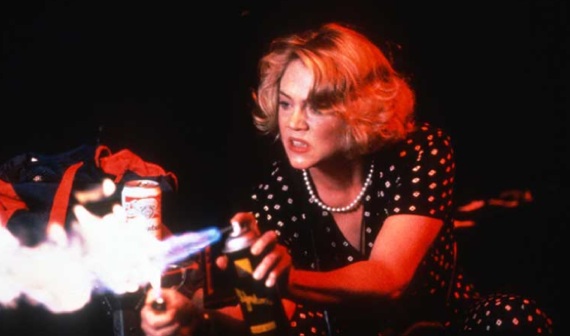
“You can’t wear white shoes after Labor Day.”
After starring in hit after hit in the 1980s, Kathleen Turner began the 90s with “V.I. Warshawski,” a feature film based on a series of popular novels which was supposed to launch a new franchise. It bombed, miserably. She needed a career reset and took the bold move of starring in a Waters film. Thankfully! Turner, sexy for sure, but always shining brightest in comedies, sells it. You get the feeling that she had a blast making the film.
Beverly Sutphin (Turner) has the perfect family. A popular son (Matthew Lillard), studious daughter (Lake), and a loving husband (Sam Waterson) with a friendly dental practice. She serves fresh strawberries for dessert and does not allow chewing gum in her tasteful suburban home. But beneath it all she is as murderous as Divine in any classic Waters movie! Beverly runs over her son’s teacher for badmouthing her son. She drops an air conditioner on her husband’s patient, and stabs his wife, for complaining about his bill and being ungrateful after Beverly’s husband cuts their weekend morning birdwatching short to perform an emergency extraction. Her daughter’s lout-of-a-boyfriend gets skewered with a fire poker in the men’s room for two-timing her daughter. And when the cops finally do begin to suspect that this lovely housewife might just be a vicious serial killer, she murders some more, protected by her veneer of normalcy, a normalcy and prosperity usually reserved for the antagonist in a Waters film. She listens to Barry Manilow while chasing down her son’s best friend after he catches her beating an elderly lady to death with a leg of lamb (as she watches “Annie”!) for not rewinding her VHS tape. Once caught, Beverly has the kind of celebrity trial the world would see for real with the OJ spectacle not long after.
It all works. Here Waters gives us a film that looks as slick as any studio feature (and sounds it too, thanks to a beautiful score by Basil Poledouris) and yet still feels completely of his own creation. It’s got quirky, but believable, side characters who don’t grate. Tons of quotable lines. And it introduced the square world to the incomparable Chesty Morgan, seen here in a clip from “Double Agent 73,” directed by Doris Wishman, who also did Chesty’s better-known film, “Deadly Weapons” (“She danced her way to murder!” growls the voiceover guy in the trailer for that sleazy classic.). And I bet more people don’t wear white after Labor Day today because of this film than because of Vogue.
5. Desperate Living (1977)
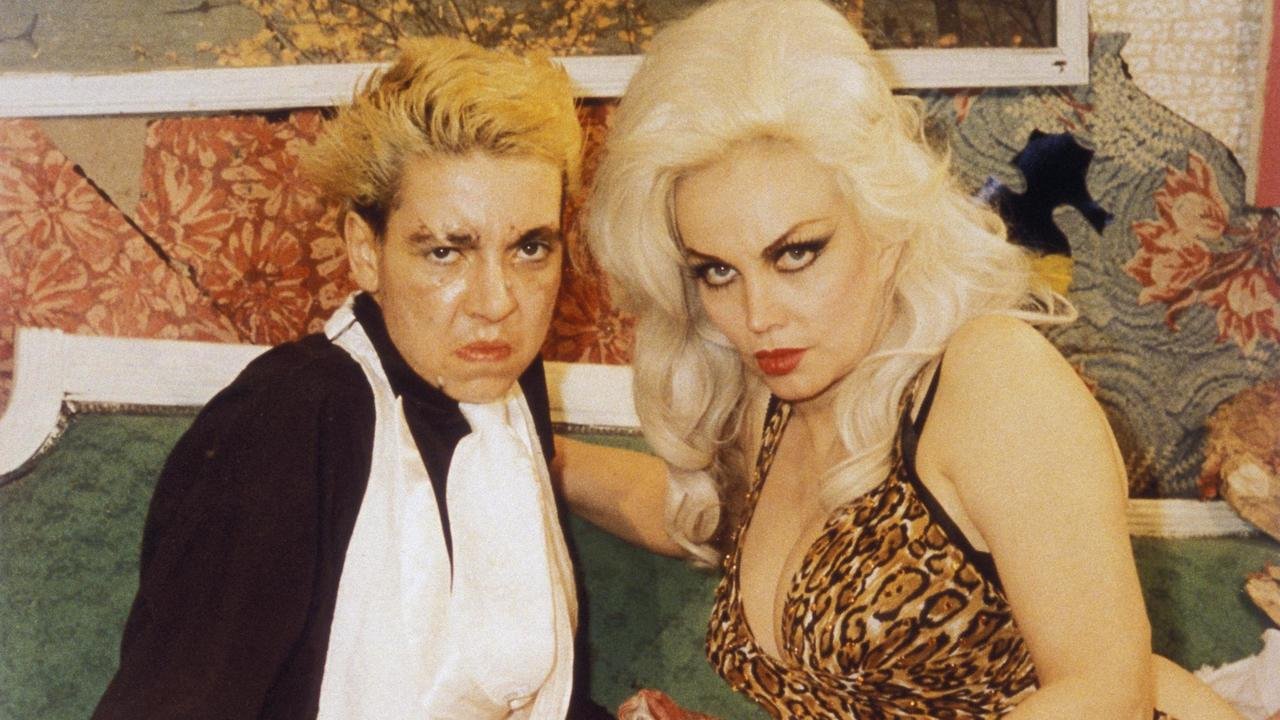
“I hate you, your husband, your children, and your relatives!”
Desperate Living starts angry and gets meaner. The first of Waters’ features without the platinum fop David Lochary and his superstar Divine. Divine was busy with a successful play in New York. Lochary died shortly after this opened, making “Female Trouble,” his last film, in which he is brilliant. They left two very difficult voids to fill. Waters turned to Dreamlanders Mink Stole, who excels at playing haughty and perverted women, and Susan Lowe, a beautiful actress who played smaller roles in previous films. Here, Lowe takes the role meant for Divine, Mole McHenry, “a man trapped in a woman’s body.” Van Smith, who shaved back Divine’s hair to make room for more eye makeup in “Pink Flamingos” turns Lowe into an unrecognizable creepy little man. She brings the rotten attitude. And to add a touch of glamor, Waters cast outside of the Dreamland circle putting Liz Renay into the role of Muffy St. Jacques. Renay, a curvy midcentury blonde bombshell, was best known for her autobiography, My Face for the World to See, (the title is made a line of dialogue spoken by Mueller in “Female Trouble”) and as a stripper with mob connections. She fits right in!
Against her doctor’s advice, Peggy Gravel (Stole) has just returned to her upper middle-class home, in a “prominent” neighborhood, after a stay in a mental institution. He calls her the “most neurotic woman” he’s ever treated. And Peggy absolutely proves that assessment to be 100% correct as she spends the first 20 minutes of the film screaming at the top of her lungs to everyone and anyone about imagined assassination attempts and how much she hates them. After she and her rotund maid Grizelda (Hill) accidently kill her uptight husband (Grizelda sits on him) they go on the run from the law. After a tawdry encounter with a perverted cop, they find their way to Mortville, where killers are allowed to “go scot-free.” They rent a room from Mole and his glamorous girlfriend, Muffy, “The most beautiful woman in Mortville.”
The town is ruled by the evil Queen Carlotta (Massey, having a blast as the cruel royal despot) whose every mortifying command is enforced by leather-clad goons, including the gang rape and exile of her daughter Princess Coo-Coo, whose romance with a nudist janitor (Jesus Christ himself, Figgs) is just not fitting for a royal princess. Peggy steps up and helps the Queen with her plan to infect the population with rabies. But Mole wins the lottery, buys some guns, and overthrows Queen Carlotta, who is roasted and eaten. A John Waters fairy tale.
The clip of Peggy screaming, “I hate the supreme court!” has gotten a lot of use on social media recently.
4. Hairspray (1988)
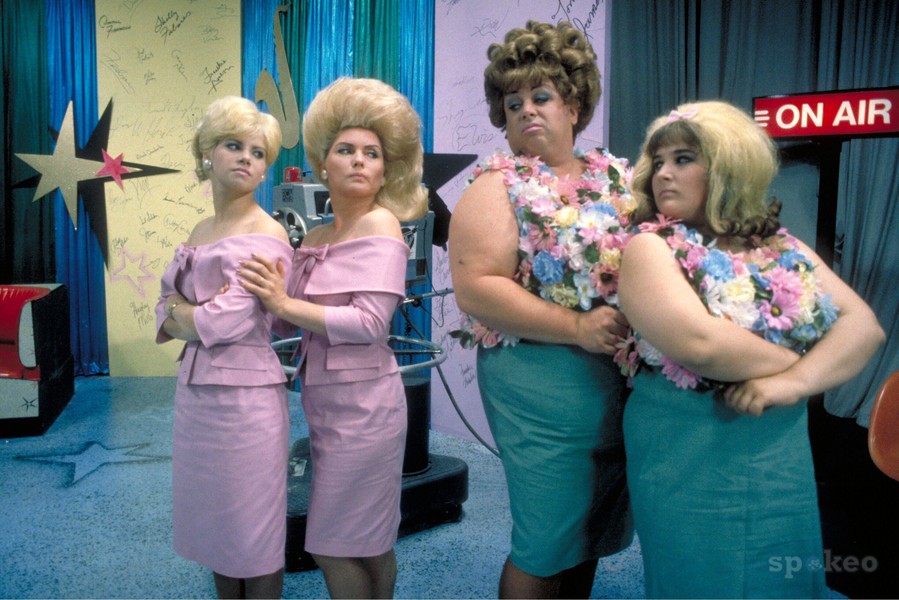
“…Tracy, I have told you about that hair, all ratted up like a teenage Jezebel!”
Waters biggest commercial hit is probably his only film you can call joyous. It introduced the world to a shining new talent, Ricki Lake, and spawned a musical, then a movie based on the musical. It was also Divine’s last film. He died soon after it opened, the night before he was set to shoot a guest starring role on “Married with Children.” He went out in glory, playing a loving mother and the racist manager of a Baltimore TV station. Where is his honorary Oscar?!
Tracy Turnblad is a plump teenager who knows how to dance. She’s got big dreams, big hair, and a big crush on Link (Michael St. Gerard), the cutest boy on “The Corny Collins Show,” a live Baltimore music and dance show every teenager in town watches and wants to be on. When Tracy auditions, she gets a coveted spot dancing on the show, catches Link’s eye, and gains an enemy, Amber von Tussle (Vitamin C).
With the backing of her rich parents (played by Debbie Harry and Sonny Bono), Amber was well on her way to winning the title of “Miss Auto Show 1963.” But Tracy gives her real competition, exposing her for the petty, spoiled, racist brat she is. “The Corny Collins Show” is segregated, which is just fine with Amber and appalls Tracy, who becomes an integrationist.
A few protests, a race riot, and a stint in reform school later, the show is integrated, and Tracy is crowned “Miss Auto Show 1963”. A whole lot more fun stuff happens, including cameos by Pia Zadora, Ric Ocasek, and John Waters himself. A great cast is rounded out by many Dreamlanders and also Jerry Stiller, Ruth Brown, and Toussaint McCall. The fun soundtrack is filled with great 60s dance songs and the contemporary title track is a blast.
No one dies. There is no nudity and not one kinky sex scene. But it is pure Waters. A fat, working class girl beats a thin, rich one on her own turf. What did Waters say about Divine? He “… represented to any kind of rebel somebody that could win.” And so does Tracy Turnblad.
There is a little puke.
3. Pink Flamingos (1972)
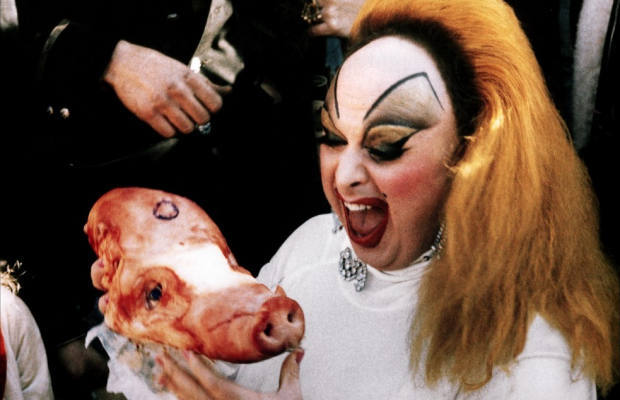
“What you are about to see is a real thing!”
Everything you’ve heard about it is true. It’s got kidnapping, murder, cannibalism, rape, incest, bestiality, baby selling, voyeurism, shrimping, arson, flashing, and stuff for which there is not even really a name. Fifty years later it is still shocking. And very funny.
Yes, Divine really does eat dog shit.
After a tabloid gives her the title of “The Filthiest Person Alive,” Divine goes underground, living in a fabulous fifties trailer in the woods with her egg-obsessed mother (Massey) “The Egg Lady”, her chicken-obsessed son Crackers (Danny Mills), and voyeuristic traveling companion Cotton (Pearce). But husband and wife Connie (Stole) and Raymond (Lochary) Marble feel that they deserve the coveted title and set about to prove it by humiliating Divine and seizing it for themselves. Bad idea.
If you look past all of the shocks and guilty laughs, “Pink Flamingos,” like most of Waters’ films, is again really about being a success by being yourself. Even if most of society looks down on you for who you are. Powerful stuff three years after Stonewall. Powerful today. As appalling and repellent and filthy as they are, the things Divine does are native to her. The Marbles make it a business. They’ve got a nice house, a butler, and a limo. Their “filthiness” is a business plan to enrich themselves. Today they’d be “influencers”, clawing at fame and hungry for attention as they push some tacky product to people gullible enough believe they are what they claim to be on social media. They never had a chance against Divine’s honest, pure filth.
2. Polyester (1981)
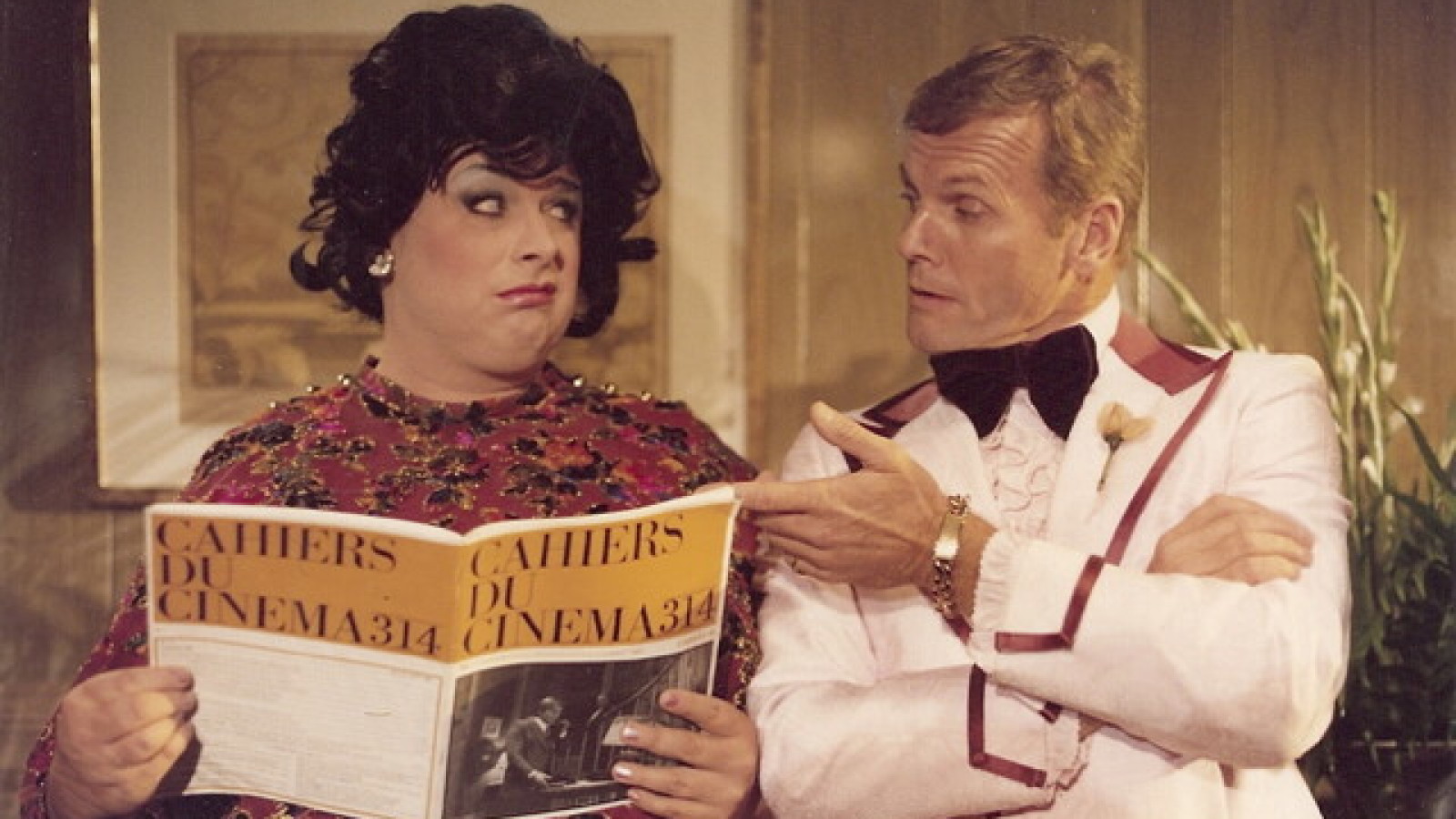
“I never wanted to use macramé to kill!”
Waters first attempt at a film approaching mainstream is a ridiculous, hilarious triumph. Famous for its William Castle-like gimmick Odorama; you scratch and sniff a card when a number flashes on the screen. It’s got something far more novel; Divine and Edith Massey playing nice!
In this melodramatic soap opera, Francine Fishpaw (Divine) is having a bad life. She’s hit 300 pounds, her toupee and leisure suit-wearing husband Elmer (David Samson) is having an affair with his secretary Sandra (Stole), her daughter Lu-Lu (Mary Garlington) is a tramp, her son Dexter (Ken King) is a glue-sniffing pervert, and her mother La Rue (Joni Ruth White) is a money-grubbing monster. But at least she’s got Cuddles (Massey), her former housekeeper who’s come into a fortune left to her by former employers. Together they each eat a cake and guzzle 2-liter bottles of soda.
After Elmer leaves her; Lu-Lu is knocked up by her trashy boyfriend Bo-Bo (punk rocker Stiv Bators); and Dexter is arrested for being the notorious “Baltimore Foot Stomper,” who has been terrorizing the city by stomping on the feet of random women in public; Francine has a breakdown and becomes an alcoholic. Understandably. But when she meets Todd Tomorrow (former teen heartthrob and genuine movie star Tab Hunter) things seem to be getting better. Here is a handsome man who loves her for who she is. She kicks the booze, Lu-Lu takes up macramé and spirituality, and Dexter, who is now a shoe-centric artist, is released from prison. She even tells off her awful mother. And Cuddles finds love with her German chauffeur. But everything is not as it seems. Todd is really in love with Francine’s mother and together they plan to toss her into an insane asylum and take all of her money. After one harrowing night, during which all is revealed and half the cast (the bad half) dies, Francine finally has the chance of living a happy life with her children.
“Polyester,” like “Hairspray,” and “Pink Flamingos” are great titles because it evokes an entire feeling, mood, time, and level of taste. After rampaging through film after film as a murderous monster, Divine gets a chance to show some range and vulnerability. Massey, always more of a character than a real actor, is a delight as Cuddles and she gets some of the best lines (“Gosh Francine, you’re the most drinkenest gal I’ve ever seen!”). Hunter, a boyhood crush of Divine’s, fits right in as easily as Liz Renay did in “Desperate Living”. He’s perfectly cast and appears to have real fun playing the duplicitous Todd Tomorrow. Divine and Tab Hunter would reunite in the Hunter produced “Lust in the Dust” a few years later, directed by mister “Eating Raoul” himself, Paul Bartel. It is highly recommended too.
1. Female Trouble (1974)

“And I’m so fucking beautiful that I can’t stand it myself!”
How do you follow up “Pink Flamingos”? Your audience may expect your next film to be even more shocking, but how? It’s not like the “Jurassic Park” movies where your CGI experts can just whip up bigger and badder dinosaurs to eat even more tourists in more inventive ways. Instead, Waters falls back on the aspect of Hollywood filmmaking that sets his films apart from so many of his fellow independent/underground filmmakers, the three-act structure, and the comfort of a cohesive story. Others rely on beautifully shot images, as easily enjoyed at your leisure in a picture book, or weirdness for the sake of weirdness, like abstract painters one suspects incapable of realism. Waters doesn’t give you more shocking shocks in “Female Trouble,” he gives you more story.
This isn’t just a comedy, it’s a saga spanning more than a decade in the life of its protagonist, Dawn Davenport (Divine) a troubled teen who assaults her parents on Christmas morning for not buying her cha cha heels. She runs away, gets knocked up in a garbage dump, and begins a life of prostitution and petty thievery with her best friends Chicklette (Susan Walsh) and Concetta (Mueller). Her daughter Taffy (Stole amazingly and believably playing 13) is a little monster who never had a chance to be anything else. Denied any formal education or friends, she spends her days fighting with her mother and playing car accident.
Dawn’s nemesis is Ida Nelson (Massey) her neighbor and the aunt of her husband Gator (Michael Potter). Massey is wonderful as the leather-clad heterophobic militant lesbian who tries to convince her nephew to be gay because, “The world of heterosexual is a sick and boring life.” It’s important to note how rare a gay or lesbian character is in Waters films, considering how deeply imbedded they are now in gay culture. Divine’s female characters were always women (not men in drag) usually in straight relationships with men. Lesbians like Ida and gays like Ernie (a memorable cameo by Bob Adams) do exist, but not as prominently in the films as one imagines. Divine may be the drag standard now, but then Divine’s persona was more Godzilla than the show girls and movie starlets drag performers aspired to be.
Dawn’s life changes when she goes to the ultra-exclusive Lipstick Beauty Salon, whose proprietors Donald (Lochary) and Donna (Pearce) Dasher offer her a chance at fame by participating in their beauty experiments. They are refined, sexless weirdos who believe that committing crimes makes you beautiful. “The worse the crime gets the more ravishing one becomes.” The crimes get worse, and Dawn’s looks become more extreme, especially after Ida throws acid in her face. When she does end up in the electric chair, it is seen by Dawn as an honor, akin to winning an Oscar in her line of work, Criminal Extraordinaire.
Perhaps the most shocking thing about “Female Trouble” is how far ahead of their time the looks are in the film. Ida’s leather jumpsuit is the kind of S&M punk that wouldn’t become popular for years, as is Dawn’s eventual mohawk. Most of Dawn’s outfits are truly innovative, especially a dress with one sleeve ending in a glove with black talons. All of the costumes are over-the-top glorious, helping to give the film a look that is more timeless than mired in the 70s chunky brown grunge that clings to most films made at the time. “Female Trouble” is the perfect place to begin a Waters adventure and end it too.